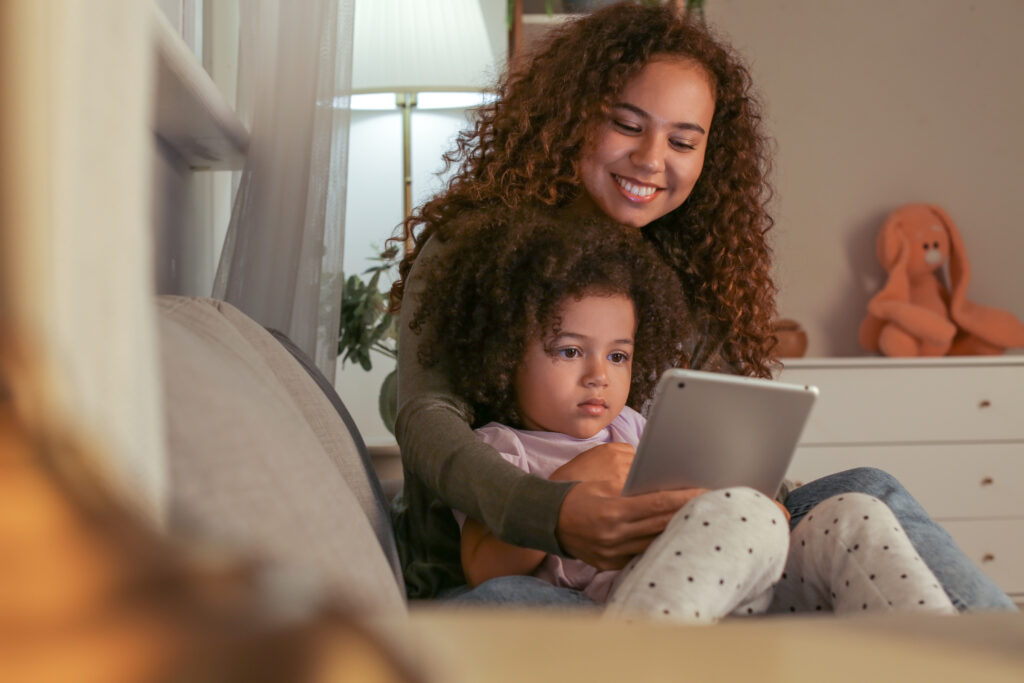
In our digitally saturated world, children encounter screens at an unprecedented rate, engaging with videos, ads, and games during unsupervised “screen time.” Meanwhile, a different digital realm exists: that of “digital books,” where parents actively participate in reading text and image-based materials with their children. How do these two realms impact parent-child communication, and what role do initiatives like Books Beginning at Birth play in promoting meaningful interactions? Let’s delve into the dichotomy.
The Screen Time Conundrum: A Study’s Perspective
A recent study, spearheaded by Mary E. Brushe and her team, delves into the implications of screen time on parent-child dialogue. Using sophisticated speech recognition technology, researchers tracked the language environment of 220 Australian families over several years. Their findings paint a concerning picture: as screen time increases, parent-child discourse diminishes. Children exposed to unsupervised screen time hear fewer adult words, vocalize less, and engage in fewer conversational exchanges with caregivers. This trend highlights the potential detriment of screen time on early childhood development.
Visualizing Screen Time vs. Digital Books
Imagine a child engrossed in unsupervised screen time, captivated by flashing images and sounds, disconnected from parental involvement. Contrast this with the scene of a parent and child nestled together, exploring the pages of a digital book, pointing at illustrations, and discussing the story. In the former, the child is passive, absorbed in solitary digital consumption. In the latter, the child is engaged, actively participating in a shared literary experience guided by parental interaction.
The Role of Books Beginning at Birth: Embracing Digital Literacy
In response to the screen time dilemma, initiatives like Books Beginning at Birth champion the transformative potential of digital books in fostering parent-child communication. Unlike passive screen time, digital books serve as catalysts for meaningful interaction between parents and children. By providing families with access to text and image-based reading materials, Books Beginning at Birth empowers parents to cultivate language-rich environments conducive to early childhood development.
Through weekly e-newsletters brimming with practical tips, Books Beginning at Birth equips parents with the tools needed to integrate digital books into their daily routines. These resources encourage active engagement, prompting parents to ask questions, spark conversations, and foster a love for reading from an early age.
Charting Progress: The Rise of Digital Literacy
The evidence speaks volumes: families are increasingly embracing digital books as vehicles for parent-child communication. Over 90% of households now incorporate digital devices into shared reading experiences, signaling a shift towards interactive, digitally mediated literacy practices. With a 4% overall increase in digital literacy from the previous year, the demand for digital resources within family literacy programs continues to grow.
Connecting Research to Practice
While BookSpring appreciates the studies that both support and are cautionary about the use of digital devices with children, the dichotomy between unsupervised screen time and interactive digital books underscores the importance of parental involvement in shaping early childhood experiences. And, while it would be ideal for every family to have home libraries of hundreds of print books, the average cost of open digital book access is far, far less. While unsupervised screen time may impede meaningful communication, initiatives like Books Beginning at Birth offer a solution: digital books that foster active engagement between parents and children. By prioritizing interactive literacy experiences, we can cultivate language-rich environments that lay the foundation for lifelong learning and communication.
Read the Full Article Here:
Brushe MEHaag DGMelhuish ECReilly SGregory T. Screen Time and Parent-Child Talk When Children Are Aged 12 to 36 Months. JAMA Pediatr. 2024;178(4):369–375. doi:10.1001/jamapediatrics.2023.6790
